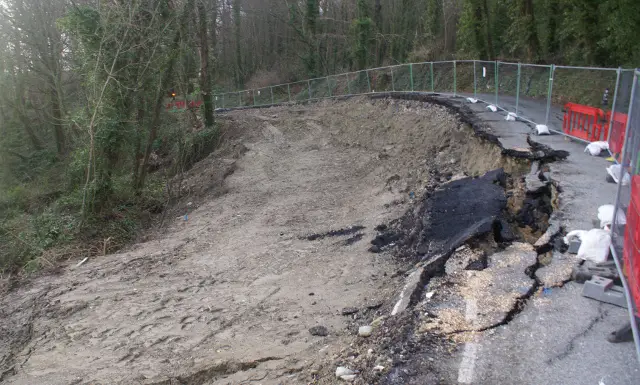Following the Isle of Wight council Executive’s approval to spend up to £500,000 on a possible three options on Undercliff Drive, OnTheWight has today received an update from the council.
Residents expressed concerns, after the Executive meeting, about still being kept in the dark as to when access to their currently landlocked properties would be reinstated.
Paper expected in October or November
OnTheWight asked what the next steps and expected time-frame for decision making were and whether the decision of which option to go for need to go back to the Executive, or will it be made by officers?
A spokesperson for the council told OnTheWight,
“A detailed paper will go before Executive in October or November recommending a solution for Undercliff Drive based on the three short term options that the Executive chose to explore at the June Executive meeting.
“The report will also include an update on the longer term drainage solution known as Option 7.
“A meeting with a peer group of experts including Dr Bruce Denness has taken place. Officers are currently working on refining costs that were discussed at the meeting for site investigation works which would include the deep drilling of further boreholes.”
Residents and insurers in the dark
Tim Wright, one of those residents who had to pack up and leave his home in 24 hours earlier this year told responded to the news. He told OnTheWight,
“It would have been basic courtesy to send this kind of information to affected residents at the earliest opportunity. The Council know that we need timescales, as do our insurers. We are reachable by email, phone, post so there is no excuse not to keep those directly affected informed. On request from the Council, we gave our permission for them to contact our insurers directly. It seems the insurers are even more in the dark about the Council’s proposals and timescales than we are.”
He went on to say,
“Leaving the poor communication aside, I am deeply concerned that a temporary quick fix is not a sustainable, cost effective or viable option. Not to mention a massive health and safety risk. Residents were evacuated because the land was moving and continues to move. It was not safe for us to live there. What has changed? We were told to sign disclaimers to use what was left of the access to reach our houses. Will we now receive a signed retraction from the Council that ‘we no longer access our properties at our own risk’; our safety is guaranteed?
“Will throwing several tons of shingle on an active landslip and a layer of asphalt address the issues of ‘the largest active landslide in North Western Europe’? A chain reaction, once started, is very difficult to resist.”
He added,
“Moving home is always stressful but being given less than 24 hours to vacate your house with the military, coastguard, fire brigade and Red Cross packing all your belongings was a really difficult experience to go through. The help we received was amazing, please do not misunderstand me.
“However, we had to go through that and then we’ve had to move twice in 6 months into different temporary accommodation. It is simply wrong to put anyone in this position again, knowing full well that the solution is temporary and the long term solution is a very distant aspiration. And, whilst the Council are cutting funding and struggling to maintain their budget, an expensive long term solution will remain nothing but an aspiration. Let’s be very clear about that.
“We are deprived of the right to enjoy our own property and are family life is affected as a result, not because our home (which I stress is fully insured for subsidence, was secured with a mortgage and has been extended after planning permission was granted) is damaged but because the access road on both sides of our house has been cut off where roadworks were in progress. In the largest landslip area in NW Europe, no other sections have failed so catastrophically.”
Have lessons been learnt?
Tim Wright finished by saying,
“In spite of these protracted delays, I am relieved that the works will not be initiated in the rainy season. Perhaps some lessons have been learned but by extension it does suggest that somebody, somewhere has now realised that carrying out works over winter 2013-2014 was a costly mistake.





